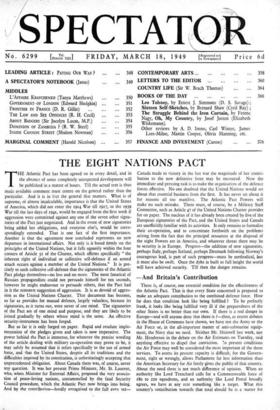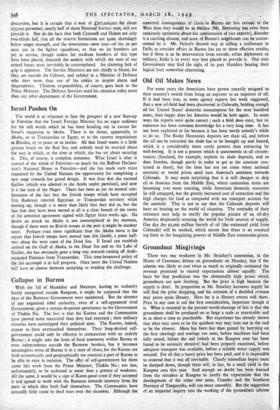—And Britain's Contribution
There is, of course, one essential condition for the effectiveness of the Atlantic Pact. That is that every State concerned is prepared to make an adequate contribution to the combined defence force. How far does that condition look like being fulfilled ? To be perfectly frank, it looks like being fulfilled very ill if the preparedness of the other States is no better than our own. If there is a real danger in Europe—and will anyone deny that there is ?—then, as recent debates in the House of Commons have shown, we have not the Army or the Air Force or, in the all-important matter of anti-submarine equip- ment, the Navy that we need. Neither Mr. Shinwell last week, nor Mr. Henderson in the debate on the Air Estimates on Tuesday, said anything effective to dispel that conviction. .7n present conditions the Air Force may well be considered the most important of the three services. To assess its present capacity is difficult, for the Govern- ment, right or wrongly, allows Parliament far less information than the American Secretary for Air freely gives the public of that country. About the need there is not much difference of opinion. When an authority like Lord Trenchard calls for a Commonwealth force of 18o to 220 squadrons, and an authority like Lord Portal broadly agrees, we have at any rate something like a target. What this country's contribution towards that total should be is a matter for discussion, but it is certain that a vote of L20.7,000,000 for about 235,000 personnel, nearly half of them National Service men, will not .provide it. Nor do the facts that both Cranwell and Halton are only two-thirds full, that all the reserve formations are quite alarmingly below target strength, and the restoration—next year—of the 5o per cent. cut in the fighter squadrons, or that no jet bombers are yet in service, though orders for medium bombers of this type have been placed, diminish the anxiety with which the state of our armed forces must inevitably be contemplated. An alarming lack of grip is apparent. The Service Ministers are not chiefly to blame, for they are outside the Cabinet, and subject to a Minister of Defence who does more than any of his critics to inspire alarm and despondency. Ultimate responsibility, of course, goes back to the Prime Minister. The Defence Services need his attention today more than any other department of the Government.







































